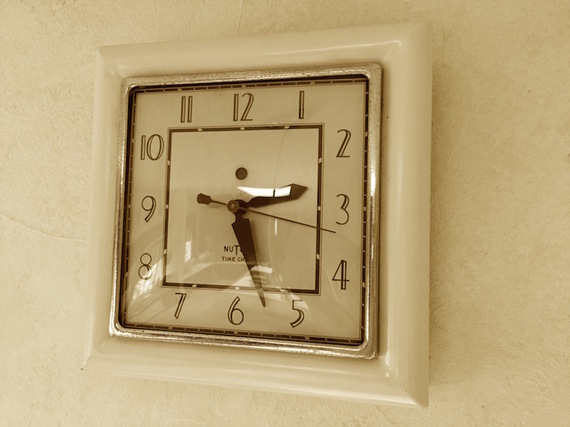I recently attended the Institute for Functional Medicine's annual conference. Dr. Jeffrey Bland gave a fascinating overview of the most recent research on clock genes. These are a variety of genes in our bodies (and in most living things) that regulate life functions. You may have heard of biorhythms or circadian rhythms; both terms refer to the action of clock genes, a hot new area of research. These genes also respond to natural environmental rhythms: sunlight and moonlight, tides, sunspots, gravitational pull, atmospheric pressure, temperature, and solar radiation.
- 4:30 am Your lowest body temperature. You might awaken at that time because you are cold (or your partner has stolen the covers because he or she is cold).
9:00 am Your highest testosterone secretion. Yes, there is a scientific reason guys are ready to go in the morning. 10:00 am Your highest alertness: best time to take an exam, have an interview, or do critical work. 2:30-3:30 pm Your best coordination and fastest reaction times, so schedule that athletic or other event that requires great hand-eye coordination for this time slot if possible. 5:00 pm Your best cardiovascular efficiency and muscle strength, so hitting the gym after work makes perfect sense. 6:30 pm Your highest blood pressure. This would be important to know if you have high blood pressure or take a medication to regulate blood pressure. 9:00 pm This is when your melatonin (the sleep hormone) should start being released if your body's systems are balanced.Other ways that clock genes affect the body:
- Causing morning joint stiffness in rheumatoid arthritis sufferers.
Triggering seasonal multiple sclerosis attacks because of lower winter light levels. Affecting the the balance of your microbiome, impacting both digestion and potentially other illnesses that those bacteria affect: obesity, metabolic syndrome, type 2 diabetes, and inflammatory bowel disease. Circadian rhythms can become out of sync due to travel or shift work. Working with clock genes (called chronotherapy) has been found to greatly reduce the toxicity and increase the effectiveness of chemotherapy. If you want to help balance your clock genes, here are some tips:
1) Get morning exercise to set your parasympathetic system. This system, known as rest and digest, oversees sexual arousal, salivation, tear formation, urination, digestion and defecation.
2) Evening exercise resets your sympathetic nervous system, the one that stimulates your fight or flight response. The sympathetic nervous system is constantly active to maintain homeostasis (systems balance) in your body, so resetting it with exercise is extremely helpful.
Researchers are also studying the effects of nutrition and eating habits on health. Here's what they recommend:
- Try to fast from dinner to breakfast for 12 hours. If you normally eat breakfast at 7 am, then no food after 7 pm. Avoid eating calorie-dense foods at night.
Regulate your light-dark exposure time. Get as much sunlight as possible and reduce screen time in the evening; blue light delays your melatonin response. Stay away from excess caffeine, otherwise it delays your melatonin rhythm by 40 minutes. Eat at regular times each day (having irregular eating patterns can directly effect your weight over time). Eat 15-20% of your calories from protein for the best sleep. Limit your intake of palmitic acid from conventionally raised animal products and foods made with palm oil. Eat low-glycemic foods (non-starchy carbs, healthy fats, and protein) and tons of vegetables, which provide phytochemicals plus the prebiotics that feed healthy gut bacteria. Finally, take your time eating. Mindful eating -- putting your fork down between bites -- helps you register when you're full, enjoy your food more, and very possibly choose fewer junk foods.20 Years OfFreeJournalism
Your Support Fuels Our Mission
Your Support Fuels Our Mission
For two decades, HuffPost has been fearless, unflinching, and relentless in pursuit of the truth. Support our mission to keep us around for the next 20 — we can't do this without you.
We remain committed to providing you with the unflinching, fact-based journalism everyone deserves.
Thank you again for your support along the way. We’re truly grateful for readers like you! Your initial support helped get us here and bolstered our newsroom, which kept us strong during uncertain times. Now as we continue, we need your help more than ever. We hope you will join us once again.
We remain committed to providing you with the unflinching, fact-based journalism everyone deserves.
Thank you again for your support along the way. We’re truly grateful for readers like you! Your initial support helped get us here and bolstered our newsroom, which kept us strong during uncertain times. Now as we continue, we need your help more than ever. We hope you will join us once again.
Already contributed? Log in to hide these messages.
Learning more about how our amazing bodies function, and how we can support our optimal health, continues to inspire me.
Dr. Jeffrey Bland is the founder and President of the Personalized Lifestyle Medicine Institute.
Stephanie Weaver, MPH, CWHC is a writer, health coach , and food blogger offering migraine-friendly recipes every week. Her book The Migraine Relief Plan will be published on February 7, 2017 by Agate Publishing; her online class is available now. Join her mailing list and follow her on Twitter and Facebook to learn more.
